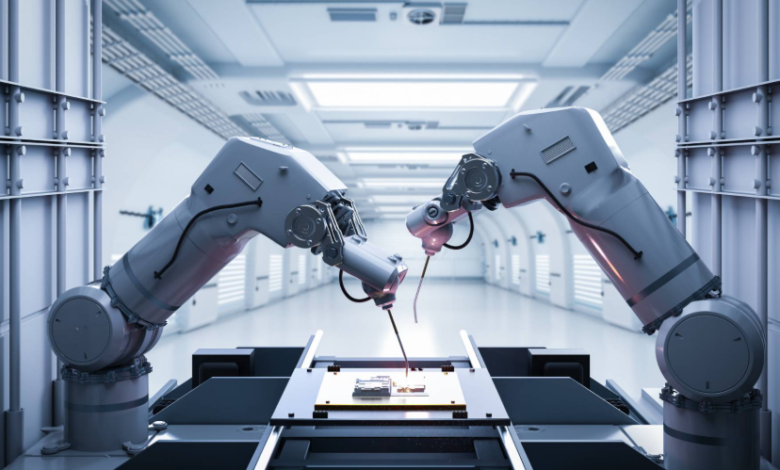The Future of Automation: How It’s Revolutionizing Industries and Changing the Workforce

Automation is undeniably one of the most transformative forces shaping the modern world. In recent years, industries across the globe have experienced significant changes thanks to advancements in technology. These innovations have streamlined processes, improved efficiency, and reduced operational costs. But automation is much more than a trend—it’s a revolution that is continuously evolving, touching virtually every sector of the economy.
As automation becomes more widespread, it’s essential to understand how it’s revolutionizing industries and reshaping the workforce. This article explores the various ways automation is transforming the business landscape and the implications it has for the future of work.
1. What is Automation?
Automation refers to the use of technology to perform tasks without human intervention. It involves the use of machines, software, and systems to carry out repetitive, time-consuming, or dangerous tasks. From the manufacturing floor to customer service chatbots, automation can be applied in almost any sector to increase efficiency, reduce human error, and lower costs.
Key Areas of Automation
- Robotic Process Automation (RPA): Utilizes software robots to automate rule-based tasks.
- Artificial Intelligence (AI): AI enhances automation by adding decision-making capabilities.
- Machine Learning: A subfield of AI where systems learn from data and improve over time.
- Internet of Things (IoT): Devices connected to the internet, enabling real-time data exchange and automation.
- Industrial Robots: Machines designed to automate physical tasks in industries like manufacturing and logistics.
2. The Rise of Smart Manufacturing and Industrial Automation
Manufacturing has been one of the primary sectors to benefit from automation. With the advent of smart technologies and connected systems, factories are becoming more efficient and productive. Smart manufacturing uses sensors, data analytics, and machine learning to enhance production processes and optimize resource use.
Impact on Manufacturing:
- Increased Productivity: Machines can work 24/7 without fatigue, increasing output.
- Customization: Automation allows for more flexible production lines, enabling businesses to meet customer-specific demands.
- Reduced Costs: Robots and automation systems lower labor and operational costs.
- Safety: Automated systems can take over hazardous tasks, reducing the risk to human workers.
See also: Implementing ISO Standards in Vendor Management: Best Practices for Compliance and Efficiency
3. Automation in the Service Sector
While automation is often associated with manufacturing, its reach extends far beyond factories. In the service sector, automation is making waves in various industries, including retail, healthcare, finance, and customer service.
Automation in Retail:
- Self-Checkout Systems: Automated checkouts allow customers to scan and pay for products without needing a cashier.
- Inventory Management: Automation helps manage stock levels, predict demand, and automate restocking.
- Personalized Marketing: AI-driven algorithms analyze customer behavior to provide tailored recommendations and promotions.
Automation in Healthcare:
- Patient Management Systems: Automating patient records, appointments, and billing improves accuracy and efficiency.
- Robotic Surgery: Robots assist surgeons in performing delicate procedures with greater precision.
- Telemedicine: AI-driven virtual consultations and diagnostic tools enable remote healthcare services.
Automation in Finance:
- Fraud Detection: Automated systems detect fraudulent transactions in real time.
- Robo-Advisors: AI-driven platforms offer personalized financial advice and portfolio management.
- Trading Bots: Algorithms trade stocks and assets automatically, making decisions faster than humans.
Automation in Customer Service:
- Chatbots and Virtual Assistants: These tools help businesses handle customer inquiries quickly and efficiently.
- Automated Call Centers: AI can handle a range of customer issues, reducing wait times and increasing satisfaction.
4. The Role of Artificial Intelligence in Automation
Artificial Intelligence is at the heart of many of today’s automation technologies. By adding cognitive capabilities to machines, AI can take automation to the next level. AI systems can analyze data, make decisions, and improve over time—tasks that were once exclusively human.
AI’s Impact on Automation:
- Improved Decision-Making: AI enables machines to make intelligent decisions based on data analysis.
- Natural Language Processing (NLP): Helps machines understand and respond to human language, as seen in virtual assistants and chatbots.
- Predictive Analytics: AI can forecast future trends, helping businesses stay ahead of the competition.
- Robots with Vision: AI-powered robots can see, recognize, and interact with objects, opening up new possibilities in manufacturing and service industries.
5. Automation’s Influence on the Global Workforce
While automation brings significant benefits to businesses, it also raises concerns about its impact on the workforce. Many fear that automation will lead to widespread job loss. However, the reality is more nuanced.
The Positive Impact:
- Job Creation: New industries and opportunities are emerging as a result of automation, particularly in tech and robotics.
- Job Transformation: Automation can free up human workers from repetitive tasks, allowing them to focus on more creative and value-added activities.
- New Skills: Workers will need to acquire new skills to adapt to the changing landscape, leading to the growth of training and education sectors.
The Negative Impact:
- Job Displacement: Some low-skill jobs may be replaced by machines, leading to unemployment in certain sectors.
- Wage Pressure: As automation reduces the need for manual labor, wages in some industries may stagnate or decrease.
- Social Inequality: Automation could widen the gap between skilled and unskilled workers, exacerbating income inequality.
6. The Future of Work: Reskilling and Upskilling
The rise of automation emphasizes the importance of reskilling and upskilling the workforce. In industries where machines are taking over routine tasks, workers must adapt to new roles that require higher-level skills.
Reskilling and Upskilling Programs:
- Online Courses: Platforms like Coursera, edX, and Udemy provide opportunities for workers to learn new skills and stay relevant.
- Corporate Training Programs: Companies are investing in employee development to ensure their workforce is prepared for the future.
- Government Initiatives: Many governments are launching reskilling programs to help displaced workers find new employment opportunities.
7. Challenges of Implementing Automation
While automation offers tremendous benefits, its implementation comes with its own set of challenges. Businesses must navigate technical, financial, and human factors when adopting automation technologies.
Key Challenges:
- High Initial Costs: Automation systems can be expensive to develop and implement.
- Technical Complexity: Integrating automation into existing systems can be complex and require specialized expertise.
- Resistance to Change: Workers and management may resist automation due to fear of job loss or unfamiliarity with new technologies.
- Data Security: Automated systems rely on vast amounts of data, making cybersecurity a critical concern.
8. Ethical Considerations of Automation
As automation becomes more prevalent, ethical questions arise regarding its impact on society. Issues like data privacy, surveillance, and the potential for bias in AI systems need to be addressed.
Ethical Concerns:
- Bias in Algorithms: AI systems may perpetuate biases if they are not properly trained, leading to unfair outcomes.
- Surveillance: Automation technologies can be used to monitor employees, raising concerns about privacy.
- Job Displacement: The ethical implications of replacing human workers with machines need to be considered, particularly in lower-income industries.
9. The Economic Impact of Automation
The widespread adoption of automation has a significant impact on the global economy. While automation increases efficiency and reduces costs, it also changes the way businesses operate and the structure of the labor market.
Economic Opportunities:
- Economic Growth: Automation increases productivity, driving economic growth and competitiveness.
- Global Competitiveness: Countries that lead in automation can gain a competitive edge in the global market.
- Innovation: Automation fosters innovation, leading to the development of new products, services, and industries.
Economic Challenges:
- Economic Disruption: Automation can disrupt traditional industries, leading to short-term economic instability.
- Income Inequality: The wealth generated by automation may be unevenly distributed, leading to growing disparities.
10. Automation and Sustainability
Automation is also playing a role in making industries more sustainable. From reducing waste to optimizing resource usage, automation technologies are helping businesses adopt more environmentally friendly practices.
Sustainability Benefits:
- Energy Efficiency: Automation can help reduce energy consumption in industries like manufacturing and transportation.
- Waste Reduction: Automated systems optimize production processes, reducing waste and improving recycling efforts.
- Sustainable Agriculture: Automation technologies in agriculture can optimize crop production and reduce the need for pesticides.
11. How Automation is Shaping Consumer Experiences
Automation is also changing the way consumers interact with businesses. From personalized recommendations to faster service, automation is creating more seamless and efficient customer experiences.
Consumer-Centric Automation:
- Smart Homes: Automation technologies allow consumers to control their homes remotely, enhancing convenience.
- Personalized Shopping Experiences: AI-powered systems offer tailored product recommendations based on past behavior.
- Faster Services: Automated customer support, order fulfillment, and delivery systems improve the speed and efficiency of services.
12. Future Trends in Automation
As technology continues to advance, the future of automation looks even more promising. Emerging trends such as quantum computing, 5G networks, and the integration of blockchain technology are expected to further revolutionize industries and the workforce.
Emerging Trends:
- Quantum Computing: Quantum computing could enhance AI capabilities and open new possibilities for automation.
- 5G Networks: Faster internet speeds will enable more advanced automation in industries like healthcare and transportation.
- Blockchain: Automation combined with blockchain could revolutionize supply chain management and data security.
13. Conclusion
Automation is no longer a distant concept; it’s here, and it’s shaping the future of industries and the workforce. While it presents challenges, particularly in terms of job displacement and ethical concerns, it also offers tremendous opportunities for growth, innovation, and sustainability. Businesses that embrace automation will be better equipped to compete in the rapidly evolving global economy.
As automation continues to evolve, workers will need to adapt by acquiring new skills and embracing change. Ultimately, automation holds the potential to create a more efficient, productive, and sustainable future for industries and society as a whole.
FAQs
- What industries are most impacted by automation?
- Automation is most prominent in manufacturing, healthcare, retail, finance, and customer service industries.
- Will automation eliminate jobs?
- While automation may displace some jobs, it also creates new roles and opportunities for workers who can adapt to new technologies.
- How does AI improve automation?
- AI enhances automation by enabling machines to make intelligent decisions based on data, improving accuracy and efficiency.
- What is the role of robotics in automation?
- Robotics plays a significant role in automating physical tasks in industries like manufacturing, logistics, and healthcare.
- What are the economic benefits of automation?
- Automation drives economic growth by increasing productivity, fostering innovation, and improving global competitiveness.
- How can workers prepare for a future dominated by automation?
- Workers can prepare by reskilling and upskilling through training programs, online courses, and certifications in emerging technologies.




